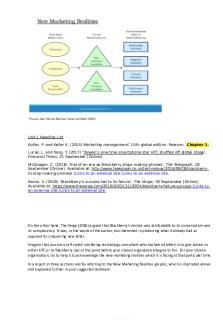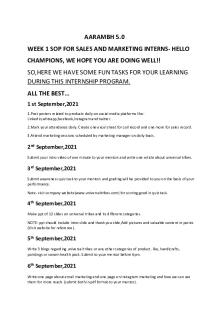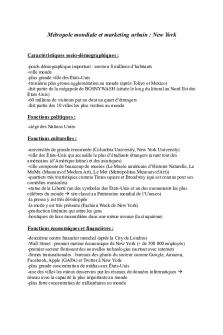New Marketing Realities PDF

| Title | New Marketing Realities |
|---|---|
| Author | Anonymous User |
| Course | Research Methodology |
| Institution | University of Southern Queensland |
| Pages | 2 |
| File Size | 132.2 KB |
| File Type | |
| Total Downloads | 62 |
| Total Views | 144 |
Summary
Download New Marketing Realities PDF
Description
Unit 1 Reading List Kotler, P. and Keller K. (2015) Marketing management. 15th global edition. Pearson. Chapter 1. Lucas, L. and Yang, Y. (2017) ‘Taiwan’s one-time smartphone star HTC shuffles off global stage’, Financial Times, 21 September [Online]. McGoogan, C. (2016) ‘End of an era as Blackberry stops making phones’, The Telegraph, 28 September [Online]. Available at: http://www.telegraph.co.uk/technology/2016/09/28/blackberryto-stop-making-phones/ (Links to an external site.)Links to an external site. Savov, V. (2016) ‘BlackBerry's success led to its failure’, The Verge, 30 September [Online]. Available at: https://www.theverge.com/2016/9/30/13119924/blackberry-failure-success (Links to an external site.)Links to an external site.
On the other hand, The Verge (2016) argued that Blackberry’s demise was attributable to its conservatism and its complacency. It was, in the words of the author, too interested in protecting what it already had as opposed to conquering new lands. Imagine that you are a self-styled marketing technology consultant who has been drafted in to give advice to either HTC or to Blackberry just at the point before your chosen organisation begins to fail. For your chosen organisation, try to help it to acknowledge the new marketing realities which it is facing at that particular time. In a report in three sections and by referring to the New Marketing Realities graphic, which is illustrated above and explained further in your suggested textbook:
1. Analyse and evaluate what you believe to be the most significant prevailing market forces currently facing the organisation. Given mobile technology is rapidly evolving (for example the development of touchscreen displays and open source operating systems), this is likely to be the most significant market force currently facing Blackberry. Indeed Kotler and Armstrong (2014) suggest that technology is perhaps the most dramatic force affecting most markets, and while new technologies create new products, they can also make others redundant. While Blackberry currently has a strong market position, and a product that offers a lot of advantages, improvements in technology, and what is subsequently possible, needs to be considered. Kotler and Armstrong (2014) argue that more than any other group marketers need to be market trackers and opportunity seekers. 2. Explain what you think will be key market outcomes (in terms of consumer and company capabilities) which you think that your organisation should respond to, shape and develop. Consumers are getting greater access to information allowing for easy product comparison, product reviews and communication with other consumers. Kotler and Keller (2015) suggest such evolving market outcomes are driving changes in channel structure and heightened competition. Similarly to needing to respond to changing market forces, Blackberry should consider such market outcomes. Similarly to new consumer capabilities, Blackberry’s growing access to information should also be leveraged. Particularly in terms of developing technology and enhanced competition, the company needs to build an understanding of evolving markets, customers and competitors, in order to appreciate changing consumer preferences and subsequent opportunities and threats. As stated by Kotler and Keller (2015, p41) “companies must always move forward, innovating products and services, staying in touch with customer needs, and seeking new advantages rather than relying on past strengths”. 3. Explain how the entire organisation could adopt a holistic marketing approach to improve its marketing function. Rather than just a focus on sales or earnings performance, Blackberry should consider developing a holistic marketing approach. Kotler and Keller (2015) argue that firms in the 21st century that acknowledge new market forces and changing capabilities, should adopt a more comprehensive marketing approach. Such an approach recognises interdependencies across a company and that a “broad, integrated perspective is often necessary” (Kotler and Keller, 2015, p43). As such the authors suggest consideration to four key areas; relationship, integrated, internal and performance marketing. Relationship marketing acknowledges a broader set of stakeholders which directly or indirectly affect the success of the firm’s marketing activities. It is argued that building mutually satisfying long-term relationships is key to developing and retaining business (Kotler and Keller, 2015). To develop an integrated marketing plan Kotler and Keller (2015) suggest developing individual marketing activities with regard to all other activities. In this way such marketing activities are leveraged to reinforce and complement each other. In terms of internal marketing, Kotler and Keller (2015) argue the importance of hiring and developing employees who embrace good customer service. Finally Blackberry should recognise not just financial performance, but also performance with regard to social and environmental outcomes.
Kotler, P & Armstrong, G 2014, Principles of marketing global edition, Pearson, Boston. Kotler, P & Keller, K 2015, Marketing management, 15th global edition, Pearson, Boston....
Similar Free PDFs

New Marketing Realities
- 2 Pages

The New Marketing Myopia Tradotto
- 12 Pages

WEEK 1 SOP Marketing Interns new
- 2 Pages

Myths and Realities of Teamwork
- 6 Pages

Jaul - Marketing Plan on New Product
- 12 Pages

NEW 2 - NEW 2
- 4 Pages

New-501 - new
- 12 Pages
Popular Institutions
- Tinajero National High School - Annex
- Politeknik Caltex Riau
- Yokohama City University
- SGT University
- University of Al-Qadisiyah
- Divine Word College of Vigan
- Techniek College Rotterdam
- Universidade de Santiago
- Universiti Teknologi MARA Cawangan Johor Kampus Pasir Gudang
- Poltekkes Kemenkes Yogyakarta
- Baguio City National High School
- Colegio san marcos
- preparatoria uno
- Centro de Bachillerato Tecnológico Industrial y de Servicios No. 107
- Dalian Maritime University
- Quang Trung Secondary School
- Colegio Tecnológico en Informática
- Corporación Regional de Educación Superior
- Grupo CEDVA
- Dar Al Uloom University
- Centro de Estudios Preuniversitarios de la Universidad Nacional de Ingeniería
- 上智大学
- Aakash International School, Nuna Majara
- San Felipe Neri Catholic School
- Kang Chiao International School - New Taipei City
- Misamis Occidental National High School
- Institución Educativa Escuela Normal Juan Ladrilleros
- Kolehiyo ng Pantukan
- Batanes State College
- Instituto Continental
- Sekolah Menengah Kejuruan Kesehatan Kaltara (Tarakan)
- Colegio de La Inmaculada Concepcion - Cebu








